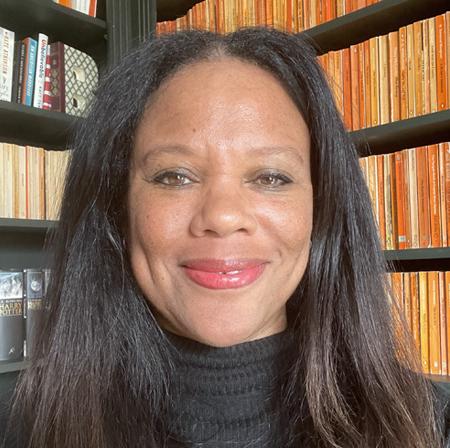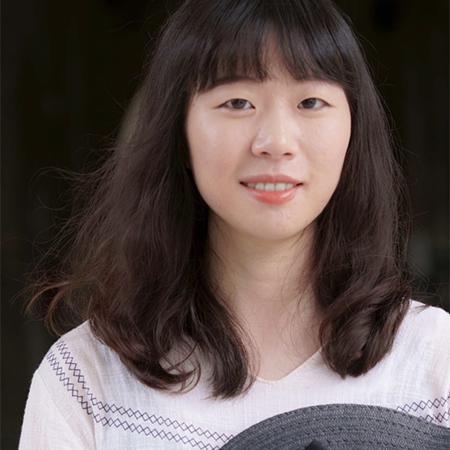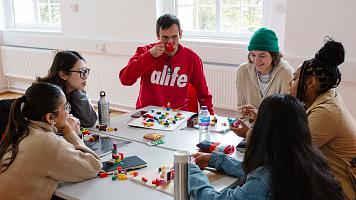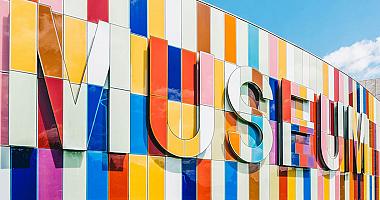MA
Arts Administration & Cultural Policy
Content navigation menu
Why study MA Arts Administration & Cultural Policy at Goldsmiths
This MA will enable you to develop an awareness of and a critical approach to the discipline of arts administration and cultural policy, by studying trending issues in cultural policy and art practice in Europe, Asia and wider international contexts.
- On this Masters from the Institute for Creative and Cultural Entrepreneurship you will study audience development and engagement, fundraising, arts education, cultural tourism, regeneration through arts, arts diversity and social inclusion, copyright and the role of the arts in international relations and diplomacy, as well as connections with local, national and supranational cultural identities.
- We use London as our classroom, encouraging you to engage with one of the most exciting art cities in the world. The programme will also draw on relationships with creative organisations across the UK, particularly in Manchester, Bristol and Brighton. Some of the best practitioners from a number of companies, venues and key arts organisations in Europe and beyond teach on the programme, providing you with a direct link with the arts and wider creative industries profession. Explore our partners in learning.
- Through individual research with focused tutorials from groups of lecturers from the programme, and a work placement with an arts organisation, you will develop essential practical skills in the highly competitive London arts scene and enhance your potential and employability as an arts administrator. Please note that a placement with any specific arts organisation is not guaranteed. However, we take you through a supportive process to connect you with an appropriate arts organisation.
- The programme also offers you one optional module in a complementary area, offered by the Institute for Creative and Cultural Entrepreneurship and the Departments of Theatre and Performance, Design, and Music.
- MA Arts Administration and Cultural Policy is a distinguished member of international professional networks such as the European Network of Cultural Administration Training Centres (ENCATC) and Association of Arts Educators (AAAE) in the USA, and a partner of the Asia-Pacific Network for Cultural Education and Research (ANCER) in Singapore.
Contact the department
If you have specific questions about the degree, contact the Programme Director.
Length
1 year full-time or 2 years part-time
Fees
Home - full-time: £12520
Home - part-time: £6260
International - full-time: £22640
Department
Music Pathway
It's also possible to follow a Music Pathway in this programme, which allows you to broaden your knowledge and skills in the music industry.
In addition to modules offered on the general MA Arts Administration and Cultural policy programme, you can study a Music Management module. At the start of the academic year you will also be able to discuss other music modules appropriate to your background.
What you'll study
| Module title | Credits |
|---|---|
| Cultural Policy and Practice | 30 credits |
| Work Placement and Culture of Management Report | 30 credits |
| Business Planning for Arts Organisations | 30 credits |
| MA Arts Administration & Cultural Policy: Dissertation | 60 credits |
Studying part-time
There are many ways of doing this degree part-time. We recommend having a conversation with the Programme Director about how to proceed, and to determine time commitments.
Teaching and learning methods
Goldsmiths recognises the importance of supporting student learning with high-quality teaching though a variety of mechanisms, lectures, seminars, workshops, group research projects with significant levels of individual tutorial support, particularly for dissertations.
What our students say



Careers
Graduates typically go on to careers in the following areas:
- Cultural policy – researching, developing, writing, analysing and evaluating policies for government and non-government bodies
- Arts administration/management in building-based and touring theatre, dance, music and visual arts organisations
- Artists that build their knowledge and skillsets and transition to add arts administration/management to their existing creative portfolio
- Arts education, arts regeneration and arts for social and community purposes
- Audience development, arts marketing, programming and planning
- Organisational development and fundraising
You will also be given individual career advice in personal tutorials, helping you identify potential areas of interest for future employment.
Our alumnni are working in a wide range of roles in the UK and internationally. Explore the section above to find out about the careers of former MA Arts Administration & Cultural Policy students.
Skills
Some of the skills you'll develop during the Masters include:
- Critical awareness of cultural policy issues
- Audience development, marketing and fundraising strategies for arts organisations
- The ability to develop organisational strategic plans
- Leadership and teamwork skills
- A range of knowledge and skills required for operating in the cultural sector
- An understanding of how new technologies impact on culture at all levels
Entry requirements
You should normally have (or expect to be awarded) the following qualifications:
- An undergraduate degree of at least upper second class standard in a relevant/related subject
You might also be considered for some programmes if you aren’t a graduate or your degree is in an unrelated field, but have relevant experience and can show that you have the ability to work at postgraduate level. We consider all aspects of your application when making a decision and may still be able to offer a place even if your qualifications or grades do not meet the published requirements.
International qualifications
We accept a wide range of international qualifications. Find out more about the qualifications we accept from around the world.
If English isn’t your first language, you will need an IELTS score (or equivalent English language qualification) of 6.5 with a 6.5 in writing and no element lower than 6.0 to study this programme. If you need assistance with your English language, we offer a range of courses that can help prepare you for postgraduate study.
Fees and funding
Annual tuition fees
These are the PG fees for students starting their programme in the 2024/2025 academic year.
- Home - full-time: £12520
- Home - part-time: £6260
- International - full-time: £22640
If your fees are not listed here, please check our postgraduate fees guidance or contact the Fees Office, who can also advise you about how to pay your fees.
It’s not currently possible for international students to study part-time under a student visa. If you think you might be eligible to study part-time while being on another visa type, please contact our Admissions Team for more information.
If you are looking to pay your fees please see our guide to making a payment.
Funding opportunities
Explore the Goldsmiths scholarships finder to find out what funding you may be eligible for.
If you are a UK student you may be eligible for a postgraduate loan.
Meanwhile our Careers Service can also offer advice on finding work during your studies.
Paying your fees
Find out about paying your tuition fees.
Additional costs
In addition to your tuition fees, you'll be responsible for any additional costs associated with your course, such as buying stationery and paying for photocopying. You can find out more about what you need to budget for on our study costs page.
There may also be specific additional costs associated with your programme. This can include things like paying for field trips or specialist materials for your assignments. Please check the programme specification for more information.
How to apply
You apply directly to Goldsmiths using our online application system.
To complete your application, you will need to have:
- Details of your academic qualifications
- The email address of your referee who we can request a reference from, or alternatively a copy of your academic reference
- Copies of your educational transcripts or certificates
- A personal statement
You'll be able to save your progress at any point and return to your application by logging in using your username/email and password.
When to apply
We accept applications from 1 October until 1 April for students wanting to start the following September.
We encourage you to complete your application as early as possible, even if you haven't finished your current programme of study. It's very common to be offered a place that is conditional on you achieving a particular qualification.
Late applications will only be considered if there are spaces available.
If you're applying for funding, you may be subject to an earlier application deadline.
Selection process
Admission to many programmes is by interview, unless you live outside the UK. Occasionally, we'll make candidates an offer of a place on the basis of their application and qualifications alone
Further guidance
Read our guide to applying for a postgraduate degree at Goldsmiths.
Top image by Graeme Worsfold.





